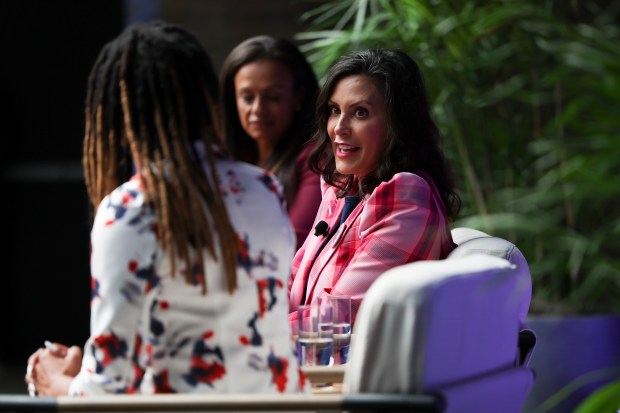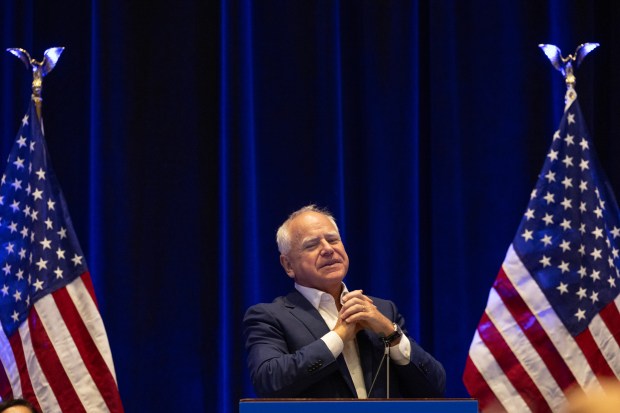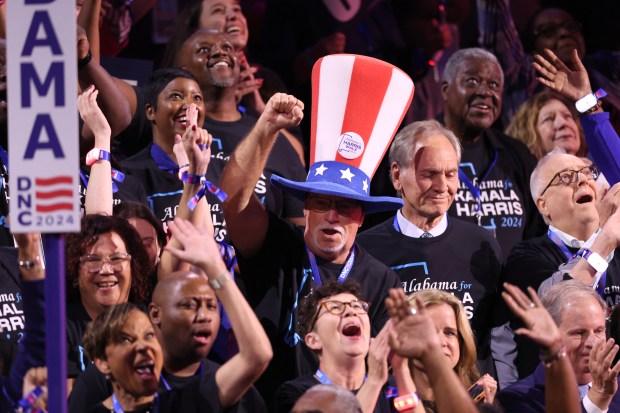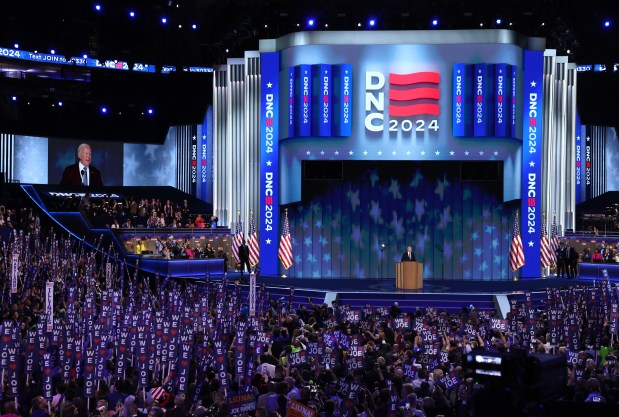Former President Barack Obama returned to his adopted hometown to keynote the second night of the Democratic National Convention on Tuesday, offering an aspirational goal for the county to elect Kamala Harris and reject “four more years of bluster and bumbling and chaos” if Donald Trump is returned to the White House.
Speaking for nearly 35 minutes, the former Illinois state lawmaker and U.S. senator who rapidly rose to serve two terms in the Oval Office, praised the qualifications and character of Harris while castigating the former Republican president and a GOP he said has turned into a “cult of personality.”
“Here’s a 78-year-old billionaire who hasn’t stopped whining about his problems since he rode down his golden escalator nine years ago. It’s been a constant stream of gripes and grievances that’s actually gotten worse now that he’s afraid of losing to Kamala,” Obama said.
“Most of all, Donald Trump wants us to think that this country is hopelessly divided between us and them, between the real Americans who of course support him and the outsiders who don’t. And he wants you to think that you’ll be richer and safer if you will just give him the power to put those ‘other’ people back in their place,” he said.
“It’s one of the oldest tricks in politics from a guy whose act has, let’s face it, gotten pretty stale,” he said. “We’ve seen that movie and we all know that the sequel’s actually worse.”
In contrast, the nation’s first Black president said, “America is ready for a new chapter” and “a better story” under Harris, the first Black and Asian American woman to become a major party presidential nominee.
Harris as a district attorney in San Francisco 20 years ago held a fundraiser for Obama to help his U.S. Senate campaign. It followed his stirring and soaring keynote address in 2004 at the DNC in Boston – a speech that catapulted him to his successful run for president four years later.
“Kamala Harris won’t be focused on her problems. She’ll be focused on yours. As president, she won’t just cater to her own voters and punish those who refuse to bend the knee. She’ll work on behalf of every American,” the former president said.
“It won’t be easy. The other side knows it’s easier to play on people’s fears and cynicism. They’ll tell you that government is corrupt,, that sacrifice and generosity are for suckers and that since the game is rigged, it’s OK to take what you want and look after your own,” he said. “We have a different task. Our job is to convince people that democracy can actually deliver. And we can’t just point to what we’ve already accomplished or only rely on the ideas of the past. We need to chart a new way forward to meet the challenges of today.”
Obama acknowledged that since his presidency, politics has become so polarized that people are “quick to assume the worst in others unless they agree with us on every single issue.”
“To make progress on the things we care about, the things that really affect people’s lives, we need to remember that we’ve got our blind spots and contradictions and prejudices and that if we want to win over those who aren’t ready to support our candidate, we need to listen to their concerns – and maybe learn something in the process.”
Obama hailed the decision by his two-term vice president, Joe Biden, not to seek a second term in the White House and pass the nomination onto Harris. Biden, he said, “was selfless enough to do the rarest thing there is in politics: putting his own ambition aside for the sake of the country.”
Obama was introduced by his wife, former first lady Michelle Obama, who recounted that her last visit to the city was due to the death in May of her mother, Marian Robinson. Michelle Obama said she was “still feeling the loss.”
But in backing Harris’ candidacy, Michelle Obama also lashed out at Trump while warning the Democratic nominee that “folks are going to do everything they can to distort the truth” about her.
“My husband and I, sadly, know a little something about this,” she said. “For years, Donald Trump did everything in his power to try to make people fear us. His limited and narrow view of the world made him feel threatened by the existence of two hardworking, highly educated, successful people who also happened to be Black.”
“I’d like to know who’s going to tell him that the job he’s currently seeking might just be one of those ‘Black jobs?’” she asked rhetorically, referring to a recent statement Trump made in Chicago while being interviewed at a National Association of Black Journalists conference in which he contended immigrants who entered the country illegally were taking “Black jobs.”
The appearance of both Obamas at the convention was celebrated wildly by convention delegates.
It also followed Monday’s keynote address by Biden, who delivered a bittersweet political farewell to a convention that thanked him for his political service and his decision to step aside from the race and endorse Harris for the nomination. The move appears to have resuscitated Democratic chances across the ballot.
On the tarmac at O’Hare International Airport before boarding Air Force One for a family vacation in California early Tuesday morning, Biden told reporters that the cheering reception he received from convention delegates Monday was “pretty overwhelming” and “meant a lot to me.”
Biden also said “no one influenced my decision” to drop from the race and that “no one knew it was coming” when he made the surprise announcement on July 21.
“You always think you could have won. And if you go back and look at the numbers, we weren’t that far behind,” he said, adding that his campaign was not “getting blown out” and that the race against Trump “would have been close.”
“What (would) have happened, though, if the discussion had been, ‘Was I going to cost seats for Democrats?’ That would have been the whole subject matter for the remainder of the campaign,” he told reporters. “You’d have to cover it. That would be the issue, and it would give him an advantage.”

Before the Obamas took the convention stage, Democrats held a ceremonial roll call of the state delegations, using DJ’d music and featuring local celebrities to announce their votes for Harris. The party previously formally nominated Harris on Aug. 6 to meet a ballot deadline in Ohio.
After the roll call, Harris spoke by video to thank convention delegates in Chicago as she campaigned in Milwaukee inside the same arena where Republicans formally nominated Trump for the presidency last month.
“I thank everyone there and here for believing in what we can do together,” she said. “This is a people-powered campaign and together we will chart a new way forward, a future for freedom, opportunity, of optimism and faith.”
The speeches capped a day in which Democrats and allied groups promoted their outreach to women on the issue of abortion rights, believing it can continue to be a powerful motivator among voters against a Republican ticket led by Trump.
EMILY’s List, a Democratic-aligned group that supports women candidates who back abortion rights, contended gains the party made in the 2022 midterm elections can be expanded this year, particularly among younger women.
In addition, Planned Parenthood’s political action committee, along with Everytown for Gun Safety, announced a combined $1 million digital ad campaign in battleground states to promote Harris and her support on the combined issues of reproductive rights and gun control.
Gov. JB Pritzker, an ardent and longtime abortion rights advocate, also spoke Tuesday night. He used his speech at the convention as host-state governor to say business leaders in some states are having trouble filling jobs because “anti-freedom, anti-family policies of MAGA Republicans are driving workers away.” MAGA was a reference to Trump’s Make America Great Again campaign motto.
“Here’s the thing. Americans don’t want to be forced to drive 100 miles to deliver a baby because a draconian abortion law shut down the maternity ward. Americans want the hope of giving birth through (in vitro fertilization), not the fear it might be taken away,” he said. “Americans with LGBTQ kids don’t want them facing discrimination at school because the state sanctioned it. Americans want to go to their neighborhood grocery store and not have to worry about some random guy open carrying an AR-15.”
Earlier in the day, Pritzker, who heads Think Big America, a dark money group helping fund abortion rights initiatives across the county, said the issue presents a valuable alignment with Harris.
“You could tell this was going to be an important issue for 2024. Now, you’ve got the added impetus that people feel for Kamala Harris,” said Pritzker while waiting to visit the California state delegation breakfast meeting as a Harris surrogate.
“This is a very important issue, right? It’s one that she talks about regularly. She understands it well,” the Illinois governor said. “And so when you put those two things together — electing Democrats means preserving your reproductive rights, and the excitement of having somebody for whom this is a top issue — the combination of that is really, I think, going to make a huge difference in pulling voters out.”

Democrats believe they can capitalize on the issue of abortion rights and Trump’s role in appointing the conservative U.S. Supreme Court majority that in 2022 reversed the landmark 1973 Roe v. Wade decision, which had created a federal right to abortion, and instead turned the issue over to individual states.
Survey results conducted by the independent expenditure arm of EMILY’s List said that in the year before the court’s 2022 Dobbs decision reversing Roe, only 20% of voters in five battleground states — Wisconsin, Michigan, Pennsylvania, Nevada and Arizona — thought Roe would be overturned. Now, nearly 70% of voters in those states think Trump would want a national abortion ban, the group said.
The survey also contended that the abortion issue is a potent one in encouraging turnout among younger women voters, who make up about 20% of the electorate in those five states.
“There is a fundamental underestimation of how dramatically the landscape has shifted since the Dobbs decision,” said Jessica Mackler, the president of EMILY’s List.
“By overturning Roe v. Wade and attacking our abortion rights, Republicans sparked outrage in women across the country — and that outrage has not dissipated,” Mackler said. “At the same time, Vice President Harris has brought a vision for the future that offers those same women hope and optimism, because they trust her to restore our rights and protect our freedoms.”
At a morning panel with leaders of Planned Parenthood and the Everytown gun safety group, Michigan Gov. Gretchen Whitmer said abortion and gun safety should not be considered political third-rail issues that would harm politicians who raise them.
“We’ve got to lean in and talk about it,” she said. “And I do think that women are at the forefront of both these movements.”
Whitmer said sharing personal stories was among the most powerful ways to let women know they’re not alone.
“It is a horrible thing that in this country, in order for a woman to be taken seriously on reproductive rights, she has to talk about, sometimes, the most horrible thing that ever happened to her,” Whitmer said.
At a Democratic women’s caucus at McCormick Place, Minnesota Gov. Tim Walz, the party’s vice presidential nominee, pointed to his track record of approving progressive policies, including guaranteeing a right to an abortion.
“Go with us, we’ll help your kids get fed. You go with us, we’ll get you an education. You go with us, we’ll leave you alone to make your own decisions,” Walz said.
But shortly after his comments, there were shouts from several anti-abortion activists while others in the crowd attempted to drown them out with chants of “USA!” The protesters were escorted from the conference room, distracting listeners from the end of Walz’s speech.

Since the high court’s Dobbs decision, 22 states have banned abortion, Planned Parenthood said. Eight states will have referendums on the November ballot dealing with abortion rights, including battleground states Nevada and Arizona, as well as Florida.
“I would say for women, it is one of the top, if not the top issue that motivates us,” said state Rep. Ann Williams of Chicago. “Without the ability to control your reproductive future, you really have no rights as a human being. For us, it feels so foundational, so basic, so important that (it’s hard) to imagine a world in which we don’t have the ability to control our bodies.”
State Rep. Dagmara Avelar of Romeoville said women “see how detrimental it could be if we don’t protect those rights.”
“There’s a lot of motivation, there’s a lot of excitement to make sure that we get a president who’s going to protect those rights,” she said.
DuPage County Board Chair Deb Conroy, a former Democratic state representative and a delegate at the DNC, said there is “no greater threat to bodily autonomy and women’s right to choose than another term of Donald Trump.”
Conroy noted the ideological and political changes that have taken place in recent years in DuPage County, which was “once one of the reddest counties in America” and was the political home of the late former U.S. Rep. Henry Hyde of Wood Dale, who authored the namesake “Hyde Amendment” that banned the use of federal funds for abortions.
Much of the movement from Republican to Democrat in DuPage has been attributed to suburban women who have long been considered as a voting bloc to be fiscally conservative but socially moderate.
“We must defeat him in November,” Conroy said of Trump. “In Illinois, we have fought to protect these rights and have become the beacon of reproductive freedom for the rest of the country.”
Pritzker said the abortion rights issue also resonates with men as well.
“The fact that we’re fighting the fight to win men to the Democratic Party, and that women are reacting first on that issue, is not surprising to me. But I do think men care deeply about it,” Pritzker said.
“It’s also a way of thinking about people’s personal freedoms, and so it affects … a panoply and a collective of personal freedom that matters,” he said. “So even if choice isn’t your No. 1 issue, it’s in that grouping of things, and it tells you something about a candidate, where they stand on choice.”
Tribune reporters Olivia Stevens, Molly Morrow, Karina Atkins, Sarah Freishtat and Dan Petrella contributed.



